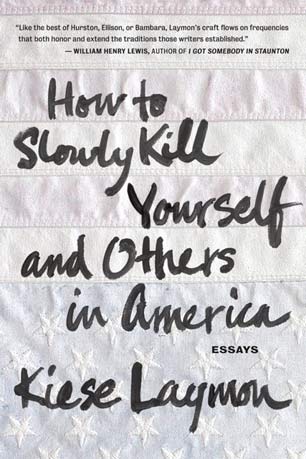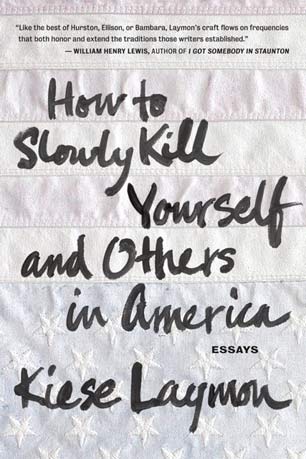 (Image: Agate Bolden)Novelist Kiese Laymon is brutally honest about his experiences growing up black in the South in a discussion that covers his work and views on racial politics in America.
(Image: Agate Bolden)Novelist Kiese Laymon is brutally honest about his experiences growing up black in the South in a discussion that covers his work and views on racial politics in America.
Essayist and novelist Kiese Laymon is unflinchingly upfront about his experiences growing up black in the South. His novel Long Division features a youngster named City who travels through time from the 1980s, to post-Katrina Mississippi in 2013 and back to the 1960s, where he confronts manifestations of racism in each time period. His collection of essays, How to Slowly Kill Yourself and Others in America, is a poignant, brutally honest view into the history of a gifted artist analyzing the world around him. Here’s an excerpt from one of his most popular and incisive essays, “The Worst of White Folks“:
The worst of white folks, I understood, wasn’t some gang of rabid white people in crisp pillowcases and shaved heads. The worst of white folks was a pathetic, powerful “it.” It conveniently forgot that it came to this country on a boat, then reacted violently when anything or anyone suggested it share. The worst of white folks wanted our mamas and grandmas to work themselves sick for a tiny sliver of an American pie it needed to believe it had made from scratch. It was all at once crazy-making and quick to violently discipline us for acting crazy. It had an insatiable appetite for virtuoso black performance and routine black suffering. The worst of white folks really believed that the height of black and brown aspiration should be emulation of its mediocre self. The worst of white folks inherited disproportionate access to quality health care, food, wealth, fair trials, fair sentencing, college admittance, college graduations, promotions and second chances, yet still terrorized and shamed other Americans who lacked adequate access to healthy choices at all. White Americans were wholly responsible for the worst of white folks, though they would do all they could to make sure it never wholly defined them.
At 39, the associate English professor at Vassar College has two new books and an essay in the works. In his latest for literary magazine Guernica, Laymon and his mother have a conversation about the realities of racism and the underlying dishonesty of President Obama’s new “My Brother’s Keeper” initiative.
Laymon answered some questions for Truthout about his work and thoughts on the state of racism in America.
Bethania Palma Markus for Truthout: Guernica asked you to write a piece about the South, and you decided to frame it as a conversation with your mother. You talked about how frightening it was for you to do this. What makes it scary, and why did you make that decision?
Kiese Laymon: That’s a tough question. Any time you open up your relationship to a region, it’s scary. Multiply that fear times a thousand when you open up your relationship with your mother, especially if your mother is really skeptical of strangers looking at our relationship to each other.
O.K., this is a long one. Bear with me. It takes a little setting up: In an excerpt from your Guernica piece, you say in regard to President Obama’s “My Brother’s Keeper” initiative, “If the president isn’t willing to even say the words ‘black love’ or ‘white supremacy’ or ‘patriarchy’ he can be black boy’s keeper, but he can’t be an honest lover of black boys. They’re trying to fix black boys on the cheap, without reckoning with white supremacy. You fix a ‘what.’ You don’t fix a ‘whom.’ What really needs fixing?” You also write that Obama’s job is “to lie to a nation of liars.” Why do you think this country is currently so dishonest with itself, to the point its first black president will not be honest about racism?
I think the country is currently dishonest because we’ve really never been anything other than dishonest. Parts of the nation just didn’t want a black man running the nation. Other parts of the nation wanted the feeling of deliverance that a black man could run the nation. But few white parts of the nation, whether they’re left or right, wanted that black president to really talk about the damage that white supremacy has done to the nation and the world. Honestly, a lot of black folks knew how hard this was going to be. A lot of us knew Obama wasn’t some race-conscious righteous crusader. We just hoped he’d be less damaging than the other guy. We knew there would be backlash. We knew he would talk down to us as president because he talked down to us as a candidate. Still, I think a number of us just hoped he didn’t get shot, truth be told. I don’t think we overestimated Obama at all. I think we may have underestimated the power and reach of white supremacy and neoliberalism.
It seems the pressure to be dishonest is more intense now than I can remember. I know someone complained to the dean at Vassar College about your unflinching Facebook posts and you were hauled in to the office. Then there was the story of Shannon Gibney, the black professor at Minneapolis Community and Technical College who got into trouble with the college because she explained racial oppression to a white student, which upset him. When I was in college, I wouldn’t have dreamed teachers could be punished for teaching facts and challenging their students’ perspectives on campus. Seems like there is a growing pressure to self-censor, to avoid addressing race and class even in environments that used to condone those discussions. Any thoughts as to why this may be?
I think that some white students feel O.K. disciplining their black and brown educators if we make them white, or not innocent. Or if we don’t center them. I don’t think it’s complicated. Often, they feel like they can “tell on us” when we make them feel things they don’t want to feel. Most students are wonderful, though, and they realize having their stability challenged is a fundamental part of education.
In the piece, you point out that it’s “dishonest and violent to focus on black boys when black girls are catching hell from everything under the sun, and catching hell from black boys and black men.” Your mother responds, “Black girls and black women don’t really buy the president anything in this country. … ” Can you elaborate on this exchange? In what ways are the values placed on the lives of black boys and black girls different?
Disciplining black men has always been one way politicians on the right and left give the nation an impression that they’re tough on crime. The right wants Obama to tell black men and boys to be more responsible. And he does. Imagine Obama talking to young white boys and telling them, “Be more responsible.” He’s doing exactly what generations of black parents and grandparents have done, except our parents and grandparents said “racism” and “white folks” and “white supremacy.” I don’t even think the right or left knows how or what to think of black girls and black women in 2014. You should ask them what they think of the experiences of black girls and black women in this country. And what they’re doing to ensure black girls and women have more access to healthy choice and second chance. The answers to that question would be shameful and despicable. Or just really, really funny.
You write a lot about your family and your experience growing up in the South, but you are perhaps one of the most brutally honest writers I know of. Do you get a lot of flak from family and friends, or ever get criticized or even threatened for the way you write?
My mother isn’t too happy with a lot of my work. But that’s O.K. I’m working, and I’ll get better. I would never write something hurtful or shameful about anyone I know and publish it without them looking at it and changing what they want. A lot of our experiences are shared. So we should share them before sending them out into the world.
Join us in defending the truth before it’s too late
The future of independent journalism is uncertain, and the consequences of losing it are too grave to ignore. To ensure Truthout remains safe, strong, and free, we need to raise $43,000 in the next 6 days. Every dollar raised goes directly toward the costs of producing news you can trust.
Please give what you can — because by supporting us with a tax-deductible donation, you’re not just preserving a source of news, you’re helping to safeguard what’s left of our democracy.
